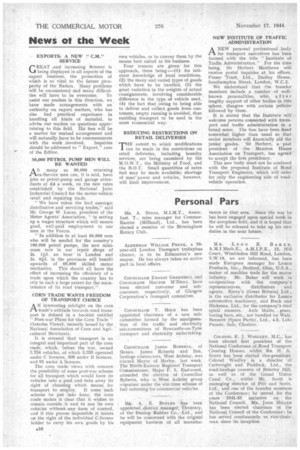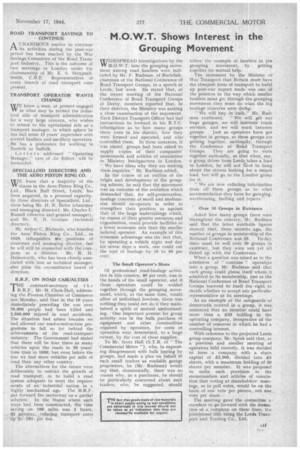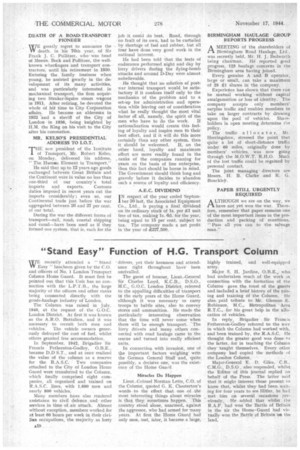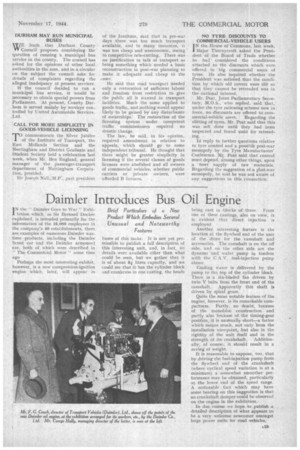News of the Week
Page 18

Page 19

Page 20

Page 21

If you've noticed an error in this article please click here to report it so we can fix it.
EXPORTS: A NEW " C.M." SERVICE REAT .arid increasing interest is 'es" being displayed in all aspects of the export business, the promotion of which is so vital to the future prosperity of the Nation. Many problems will be encountered and many difficul ties will have to be overcome. To assist our readers in this direction, we have made arrangements with an authority on export matters, who has also had practical experience in handling all kinds of material, to advise our readers on questions appertaining to this field. His fees will be a matter for mutual arrangement and will naturally have to be commensurate with the work involved. Inquiries should be addressed to " Export," care of the Editor.
50,000 PETROL PUMP MEN WILL BE WANTED
•
A S many as 50,000 returning ti.ex-Service men can, it is said, have jobs as petrol-pump and garage attendants at £4 a week, on the new rates established by the National Joint Industrial Council for the motor-vehicle retail and repairing trade.
" We have taken the lead •amongst distributive and servicing trades," said Mr. George W. Lucas, president of the Motor Agents' Association, " in setting • up a wages structure which will ensure good, well-paid employment to our men in the Forces.
" In addition to at least 50,000 men who will be needed forthe country's 100,000 petrol pumps, the new minimum rate in our repair shops of 2s, Id. an hour in London and 2s. Oise in the provinces will 'benefit upwards of 60,000 skilled motor mechanics. This should all have the effect of increasing the efficiency of a trade upon which the country has to rely to such a large extent for the-maintenance of its road transport."
CORN TRADE WANTS FREEDOM OF TRANSPORT CHOICE
AN interesting sidelight on the corn trade's attitude towards road transport is defined in a booklet entitled " Post-war Plans for the Corn Trade" (Interim Views), recently issued by the National Association of Corn and Agricultural Merchants.
It is stressed that transport is an integral and important part of the corn trade, which, before the war, owned 3,754 vehicles, of which 3,856 operated under C licences, 30$ under B licences, and 91 under A licences.
The corn trade views with concern the possibility of some post-war scheme for all, transport which would force its vehicles into a pool and take away its right of choosing which mean e for transport to employ. If some such scheme be put into force, the corn trade makes it clear -that it wishes to remain .outside it andto run its own vehicles without-a.ny .form of control, and if this proves impossible it insists on the right of the individual C-licence holder to carry his own goods by his
own vehicles, Or to convey them by the means best suited to his business.
Four reasons are given for this approach, these being :—(1) An intimate knowledge of local conditions, (2) the many and varied types of goods which have to be handled, (3) the great variation in the weights of actual consignments, involving considerable difference in the type of vehicle used, (4) the fact that owing to being able to deliver and collect goods from customers, empty running is avoided, thus enabling transport to be used in the most economical way.
REDUCING RESTRICTIONS ON RETAIL DELIVERIES
THE extent to which modifications can he made in the restrictions on retail deliveries, including laundry services, are being examined by the M.O.W.T., the Ministry of Food, and the B.O.T. Small quantities of extra fuel may be made available; shortage of manpower and vehicles, however, will limit improvement.
NEW INSTITUTE OF TRAFFIC ADMINISTRATION
ANEWpersonal professional body for transport executives has been formed with the title " Institute of Traffic Administration." For the time being, Sir Herbert Matthews will receive postal inquiries at his offices, Fraser -Trust, Ltd., Dudley House, Southampton Street, London, W.C.2.
We understand that the founder members include a number of wellknown personalities, who, af ter lengthy support of other bodies in this sphere, disagree with certain policies followed by them.
It is stated that the Institute will welcome persons connected with transport and traffic administration in a broad sense. The fees have been fixed somewhat higher than usual so that senior members will financially aid the • junior grades. Sir Herbert, a past president of the Mansion House Association on Transport, has agreed to accept the first presidency.
This new body must not be confused with the proposed Institute of Road Transport Engineers, which will cater for only the engineering side of roadvehicle operation. ROAD TRANSPORT SAVINGS TO CONTINUE
AUNANIMOUS resolve to continue its activities during the post-war period has been reached by, the War Savings Committee of the Road Transport Industry. This is the outcome of two meetings in London under the chairmanship of Mr. E. S. ShrapnellSmith, C.13.E. Representatives of every branch of road transport were present.
TRANSPORT OPERATOR WANTS TRANSPORT OPERATOR WANTS , CHANGE WE know a man, at present engaged VV in what may be termed the industrial side of transport administration for a very large concern, who wishes to return to the operational side as a transport manager, in which sphere he has had some 12 years' experience with several hauliers and ancillary operators. He has a preference for working in Norfolk or Suffolk.
Letters addressed " Operating Manager," care of he Editor, will be
forwarded. '
SPECIALLOID DIRECTORS AND THE AERO PISTON RING CO. ,
WE learn that a majority of the shares in the Aero Piston Ring Co., Ltd., Black Bull Street, Leeds, has been acquired, in a personal capacity. bY three directors of Specialloid, Ltd.. these being Mr. H. N. Bates (chairman and managing director), Mr. Charles F. Russell (director and general manager), and Mr. E. B. Graham (technical director).
Mr. Arthur C. Richards, who founded the AeroPiston Ring Co., Ltd., in 1929, relinquishes the positions of chairman and managing director, but he win still be connected with the company as a director. Mr. R. H. Hainsworth, who has been closely associated With him as technical manager, also joins the reconstituted board of directors.
B.R.F. ON ROAD CASUALTIES
THE assistant-secretary of t h e B.R.F., Mr. M. Clark-Hall, addressing the Preston Chamber of Commerce last Monday, said that in the 10 years immediately preceding the war over 70,000 people had been killed and 2,500,000 injured in road accidents. The situation had arisen because we had allowed our road-construction programme to fall so far behind the aishievements of the road-transport industry. The Government had stated that there will be four times as many vehicles upon the roads in 20 years' time than M 1939; but even before the war we had more Vehicles per mile of road than any other country.
The alternatives for the future were deliberately to restrict the growth of road transport, or to build a road system adequate to meet the requires ments of an industrial nation in a highly 'mechanical age. The B.R.F. put forward the motorway as a partial solution: In the States where such ways had been constructed, the time saving on ,100 miles was 2 hours, :13 minete.s,.,_reducieg , transport costs by -2s. 10d, per ten.
DEATH OF A ROAD-TRANSPORT PIONEER
WE greatly regret to announce the IV death, in his 76th year, of Sir Frank J. C. PoHazer, whowas head of Messrs: Beck and Pollitzer, the wellknown wharfingers and transport contractors, until his retirement in 1930. Entering the family business when young, he assisted greatly in the development of its many activities, and was particularly interested in mechanical transport, the firm acquiring two Strakcr-Squire steam wagons in 1911: After retiring, he devoted the whole of his time to City Corporation affairs. He became an alderman in 1932 and a sheriff of the City of London in 1936, being knighted by H.M. the King on his visit to the City after his coronation.
MR. KELSO'S PRESIDENTIAL ADDRESS TO I.O.T.
TIE new president of the Institute of Transport, Mr. Robert Kelso, on Monday, delivered his address, 'The Human Element in Transport." He said that up to 12 years ago goods exchanged between Great Britain and the Continent were in value no less than one-third of our country's total imports and exports. Customs duties impcAd in recent years cut the imports considerably ; even so, our Continental trade just before the war aggregated between 26 and 27 per cent. of our total.
During the war the different forms of transport—rail, roach coastal shipping and canal—have been used as if they formed one system, that is, each for the job it could do best. Road, through no fault of its own, had to be curtailed by shortage of fuel and rubber, but all four have done very good work in the national interest.
He had been told that the feats of endurance performed night and day by lorry drivers during the flying-bomb attacks and around D-Day were almost unbelievable.
He thought that no solution of postwar internal transport would be satisfactory if it confines itself only to the mechanics of the problem and to a set-up for administration and operation while leaving out of consideration what he really thought the most vital factor at all, namely, the spirit of the men who have to do the work. If nationalization would create this feeling of loyalty and inspire men to their best effort, and if it will do this more certainly than any other system, then
it should be welcomed_ If, on the other hand, loyalty and maximum effort are more readily found in the _ ranks of the companies running for years on the basis of free enterprise, then this fact should be borne in mind. The Government should think long and gravely before it decides to abandon such a source of loyalty and efficiency.
A.E.C. DIVIDEND
IN respect of the year ended Septem
ber 30 last, the Associated Equipment Co., Ltd., is paying a final diiidend on its ordinary stock of Is. per £1 unit free of tax, making is. 6d. for the year, being equal to 15 per cent, subject to tax. The company made a net profit in the year of £227,500. BIRMINGHAM HAULAGE GROUP REPORTS PROGRESS
A MEETING of the shareholders of CA Birmingham Road Haulage, Ltd., was recently held, Mr. H. J. Bedworth being chairman. He reported good progress, 123 haulage concerns in the Birmingham area having joined.
Every genuine A and B operator, large or small, can take a maximum of 25 £1 shares in the company.
Experience has shown that there can be mutual working without capital amalgamation or loss of identity. Thecompany accepts only members' surplus traffic and enables members to take on larger contracts by drawing upon the pool of vehicles. Shareholders in open meeting determine the policy.
The traffic all oca to r, Mr. Herringshaw, stressed the point that quite a lot of short-distance traffic under 60 miles, originally done by members' vehicles, was now going through the M.O.W.T. R.H.O. Much of the lost traffic could be regained by personal contact.
The joint managing . directors are Messrs. IL B. Clarke and K. G. Bouck10.
PAPER STILL URGENTLY REQUIRED
ALTHOUGH we are on the way, We have not yet won the war. Therefore, remember that paper remains one of the most important items in the production and packing of munitions. " Pass all you can to the salvage man."
DURHAM MAY RUN MUNICIPAL BUSES
WIE learn that .Durham County VV Council proposes considering the question of running a municipal bus service in the county, The council has asked for the opinions of other local authorities in the area, and in a circular on the subject the council asks for details of complaints regarding the alleged inadequacy of present services.
If the council decided to run a municipal bus service, it 'would be necessary to obtain special powers from Parliament. At present, County Durham is served mainly by services controlled by United Automobile Services, Ltd.
CALL FOR MORE SIMPLICITY IN GOODS-VEHICLE LICENSING
rcommemorate the Silver Jubilee of the Institute of Transport, the East Midlands Section and the Nottingham and District Graduate and Student Society held a celebration last week, when Mr. Ben England, general manager of the passenger-transport department of Nottingham Corporation, presided.
Sir Joseph Nall„M.Ps, past president
of the Institute, said that in pre-war days there was too much transport available, and in many instances, it was too cheap and uneconomic, owing to competitive rate-cutting. There was no justification in talk of transport as being something which needed a basic reconstruction in post-war planning to make it adequate and cheap to the
• user,
He said that road transport heeded only a restoration of sufficient labour and freedom from restriction to give the public all it wanted in transport facilities. Much the same applied to goods traffic, and nothing would appear likely to be gained by any disturbance of ownerships. The restoration of the licensing system under competent traffic commissioners required no drastic change.
The law, he said, in his opinion, required amendment in relation to appeals, which should go to some independent tribunal. He thought that there might be greater simplicity in licensing if the several classes of goods licences were abolished and all owners of commercial vehicles, whether public carriers or private owners, were 'afforded B licences. NO TYRE • DISCOUNTS TO COMMERCIAL-VEHICLE USERS 1 IN the House of Commons, last week, Major Thorn ycroft asked the President of the Board of Trade whether he had ' considered the conditions attached to the discounts which were offered . to ' big commercial users of tyres. He also inquired whether the President was satisfied that the condition by which, old covers were Slit so that they cannot be retreaded was in the national interest.
• Mr. Peat, Joint Parliamentary Secretary, M.O.S., who replied, said that, under the tyre rationing scheme now in force, no discounts are offered to cornmercial-vehicle users. • Regarding the slitting of tyres, Mr. Peat said that this was rust done until they had been inspected and found unfit for retreading.
Li reply to further questions relative to tyre control and a possible post-war monopoly by the Tyre Manufacturers' Conference. Mc. Peat said that control must depend, among other things, upon a freer supply of raw materials. Regarding the suggestion of .a Pbst-war monopoly, he said he was not aware of any suggestions in this connection.




















































